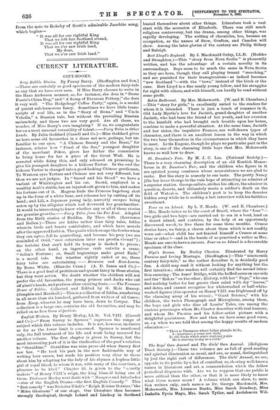CURRENT LITERATURE.
GIFT-BOOKS.
Soap Bubble Stories. By Fanny Barry. (Skeffington and Son.) —These are certainly as good specimens of the modern fairy-tale as any that we have ever seen. If Miss Barry chooses to write in the Hans Andersen manner, as, for instance, she does in "Dame Fossie's China Dog," and " A Scrap of Etruscan Pottery," she does it very well. " The Hedgehogs' Coffee Party," again, is a model of quaint sub-humorous fancy. Sometimes we have little trans- scripts of real life, as in the " Story of Siena," and " Uncle Volodia," a Russian tale, but without the prevsilin,, Russian melancholy, and these two are very good. Are all these, we wonder, of Miss Barry's own imagining ? If so, we congratulate her on a most unusual versatility of talent.—Fairy Tales in Other Lands. By Julia Goddard (Cassell and Co.)—Miss Goddard gives us here some old favourites in a dress not new, perhaps, but un- familiar to our eyes. "A Chinese Beauty and the Beast," for instance, relates bow " Pearl of the Sea," youngest daughter of the merchant Pekoe, gives her father the commission to bring home for her a piece of the Great Wall. He is arrested while doing this, and only released on promising to give his youngest daughter to a hideous Tartar. In the end the hideous Tartar is changed into a good-looking Chinese gentleman. To Western eyes Tartars and Chinese are not very different, but then we are not judges. In " Saoud and his Steed" we have a variant of Whittington and his cat. Saoud, employed in a wealthy Arab's stable, has an injured colt given to him, and makes his fortune out of it. Magnus finds the Princess Ingeborg shut up in the form of a white bear, and releases her by cutting off its head ; and Lili, a Japanese young lady, narrowly escapes being eaten up by the alligator which had devoured her grandmother. It would be interesting to know whether any or all of these stories are genuine growths. Fairy Tales from the Far East. Adapted from the Birth stories of Buddha. By Theo. Gift. (Lawrence and Bullen.)—These are fables rather than fairy tales, fables wherein birds and beasts confabulate, and which have morals after the approved fashion. The quails which escape the fowler when they can agree, fall to quarrelling, and become his prey (we are reminded of Ovid, " ecce coturnices inter sua proelia vivunt") ; the tortoise that can't hold its tongue is dashed to pieces ; on the other hand, an ingenious crab outwits a crane. " Selim's Fortune ; or, Small beginnings make great Ends," is a moral tale. But whether rightly called or no, these fairy tales are entertaining. — Brownies and Rose-Leaves. By Roma White. (Blanche Cram.) (A. D. limes and Co.)— There is a good deal of prettiness and quaint fancy in these stories, but they want action. We doubt whether the children will not prefer the old favourites, the young princes and Jacks who cut off giant's heads, and perform other exciting feats.—The Treasure House of Fables. Collected and Edited by G. Moir Bussey. (Simpkin and Marshall.)—This is a collection of fables, numbering
in all more than six hundred, gathered from writers of all times ; from $sop, whoever he may have been, down to Cowper. The collection is a large one, contains the old favourites, and may be relied on as free from objection.






















































 Previous page
Previous page